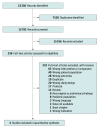Continuation of Antidepressants vs Sequential Psychological Interventions to Prevent Relapse in Depression: An Individual Participant Data Meta-analysis
- PMID: 34009273
- PMCID: PMC8135055
- DOI: 10.1001/jamapsychiatry.2021.0823
Continuation of Antidepressants vs Sequential Psychological Interventions to Prevent Relapse in Depression: An Individual Participant Data Meta-analysis
Abstract
Importance: Depression frequently recurs. To prevent relapse, antidepressant medication is often taken in the long term. Sequentially delivering a psychological intervention while undergoing tapering of antidepressant medication might be an alternative to long-term antidepressant use. However, evidence is lacking on which patients may benefit from tapering antidepressant medication while receiving a psychological intervention and which should continue the antidepressant therapy. A meta-analysis of individual patient data with more power and precision than individual randomized clinical trials or a standard meta-analysis is warranted.
Objectives: To compare the associations between use of a psychological intervention during and/or after antidepressant tapering vs antidepressant use alone on the risk of relapse of depression and estimate associations of individual clinical factors with relapse.
Data sources: PubMed, the Cochrane Library, Embase, and PsycInfo were last searched on January 23, 2021. Requests for individual participant data from included randomized clinical trials (RCTs) were sent.
Study selection: Randomized clinical trials that compared use of a psychological intervention while tapering antidepressant medication with antidepressant monotherapy were included. Patients had to be in full or partial remission from depression. Two independent assessors conducted screening and study selection.
Data extraction and synthesis: Of 15 792 screened studies, 236 full-text articles were retrieved, and 4 RCTs that provided individual participant data were included.
Main outcomes and measures: Time to relapse and relapse status over 15 months measured via a blinded assessor using a diagnostic clinical interview.
Results: Individual data from 714 participants (mean [SD] age, 49.2 [11.5] years; 522 [73.1%] female) from 4 RCTs that compared preventive cognitive therapy or mindfulness-based cognitive therapy during and/or after antidepressant tapering vs antidepressant monotherapy were available. Two-stage random-effects meta-analysis found no significant difference in time to depressive relapse between use of a psychological intervention during tapering of antidepressant medication vs antidepressant therapy alone (hazard ratio [HR], 0.86; 95% CI, 0.60-1.23). Younger age at onset (HR, 0.98; 95% CI, 0.97-0.99), shorter duration of remission (HR, 0.99; 95% CI, 0.98-1.00), and higher levels of residual depressive symptoms at baseline (HR, 1.07; 95% CI, 1.04-1.10) were associated with a higher overall risk of relapse. None of the included moderators were associated with risk of relapse.
Conclusions and relevance: The findings of this individual participant data meta-analysis suggest that regardless of the clinical factors included in these studies, the sequential delivery of a psychological intervention during and/or after tapering may be an effective relapse prevention strategy instead of long-term use of antidepressants. These results could be used to inform shared decision-making in clinical practice.
Conflict of interest statement
Figures


References
-
- Lubian K, Weich S, Stansfeld S, Bebbington P. Mental health treatment and services. In: McManus S, Bebbington P, Jenkins R, Brugha T, eds. Mental Health and Wellbeing in England: Adult Psychiatric Morbidity Survey 2014. NHS Digital; 2016. https://files.digital.nhs.uk/pdf/t/f/adult_psychiatric_study_ch3_web.pdf
-
- American Psychiatric Association . American Psychiatric Association Practice Guidelines for the Treatment of Patients With Major Depressive Disorder. 3rd ed. American Psychiatric Association; 2010. doi: 10.1176/appi.books.9780890423387.654001 - DOI
-
- National Institute for Health and Care Excellence. Depression in adults: recognition and management. October 2009. Accessed April 1, 2021. https://www.nice.org.uk/guidance/cg90 - PubMed
Publication types
MeSH terms
Substances
LinkOut - more resources
Full Text Sources
Other Literature Sources
Medical

